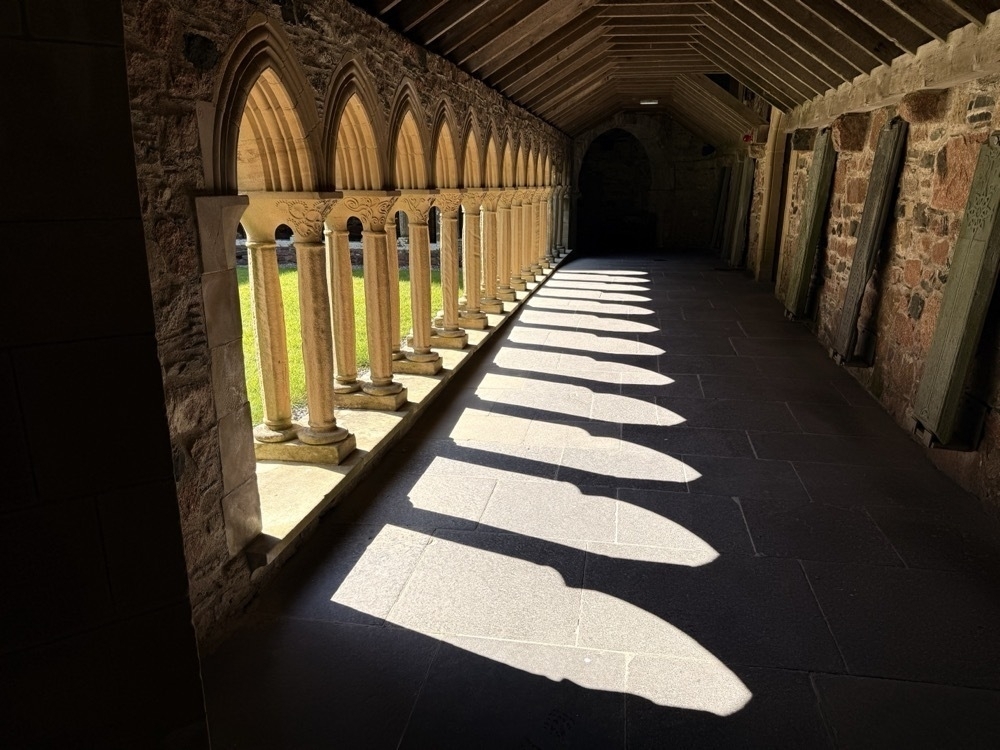Iona cloisters
A brilliant piece on Ukraine’s queer soldiers.
“This is probably the first war where so many openly LGBT+ soldiers are fighting on the frontline,” he says. “That in itself is a sign: we’re fighting not just for borders, but for values. We’re like a diamond coating on a blade – the first to hit this threat, cutting through metal.
Iona cloisters
Iona harbour
Bus to Fionnphort
Glasgow to Oban must be one of the best train journeys anywhere, which I will attempt to demonstrate with grainy pictures taken through dirty windows.
In the late twentieth century, then, in a world of banality and commercialized religion in which God had become “nice,” mysticism promised to help “unchain” God from the small, moralistic demands laid on him-to let God be wild and free and daring and beautiful.
An Introduction to Christian Mysticism by Jason M. Baxter 📚
Heading to Iona
Saturday, May 10, 2025
I’m in Glasgow, catching the train to Oban on the way to Iona. This is the first time I have been since I was accepted onto the New Members Programme of the Iona Community. My involvement with the community has been a huge influence on my life over the last couple of years and I’m excited to have the opportunity to join. I’ve been interested in community life for many years, but this is the first time that a community has felt right for me.
I really enjoyed this piece by Fr Stephen on the glories of creation:
The great tragedy of secularism is its reduction of all things to mere things. We are created to have right relationships with all things as well as all people. At its heart this right relationship is the manifestation of love. And this love is joy and wonder at the very giftedness of the world – itself the manifestation of God’s love towards us.
Roseberry Topping from the Cleveland Hills.
Mr. Kind is not the first Jewish pope, Dr. Palmer said. There have also been two Muslim popes and a transgender pope. “We haven’t yet had a Catholic pope,” she said.
‘The Only Person in the World Claiming to Be the Pope Right Now’
H/T @ayjay
Dana’O Driscoll once again has a bleak account of ecological and economic collapse.
This is no longer fixable, but does drive us to build community and local resilience.
All of this has made me consider my relationships to everything… My relationship to the garden, to the land, to the homestead. My relationship to myself. My relationship to the rain, light, wind, and soil. My relationship to the communities to which I belong. And building those relationships are meaningful and that will root and sustain me through this chaos. I take a breath and be grateful to be alive. And just maybe, I put in a larger patch of potatoes.
You have permission to be ordinary. To live a quiet life. To go for a walk without turning it into content. To do good work without chasing viral. To be present with your people instead of always ‘building something.’ Your life doesn’t have to be optimised to be meaningful. The Ordinary creates space for what truly matters.
David Keeler via @ReaderJohn
Pennhill from Leyburn Shawl

St. Margaret’s Church Preston under Scar.

A lovely account of the meaning kitchen objects can play in our lives.
Death, divorce and the magic of kitchen objects: how to find hope in loss
A five minute break in the work day to see the sea in Marske.


Alex Evans' views on international development find an unusual expression:
My computer had gone on the fritz during a password update, and in order to resolve it I’d had to tell the tech support guys my old password over the phone – while a senior official was in the room. Imagine my joy as I had to spell out “f-u-c-k-i-n-c-r-e-m-e-n-t-a-l-i-s-m” while my visitor attempted and failed to stifle their mirth.
The whole piece is a wonderful description of grass roots development.
Ali Cobby Eckermann:
Sit down sorry camp
Might be one week
Might be long long time
Tell every little story
When the people was alive
Tell every little story more
Pádraig Ó Tuama: The poem has an intelligence about lament too. And that leads me to my question: What’s a sorrow that’s been a teacher to you in your life?
For Francis, Jesus Christ was not mere abstraction, but a man of flesh: “that flesh made of passions, emotions and feelings, words that challenge and console, hands that touch and heal, looks that liberate and encourage, flesh made of hospitality, forgiveness, indignation, courage, fearlessness; in a word, love.” He ended his letter with the words of Paul Celan: “Those who truly learn to see, draw close to what is unseen.”







